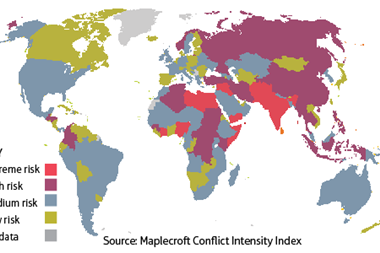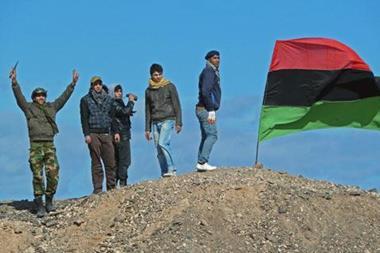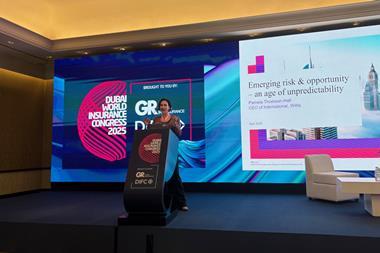Terrorists are exploiting the civil war in Libya, says Maplecroft’s Jordan Perry
Al-Qaeda and other Islamist militants may seek to exploit the insecurity in Libya generated by a civil war between Gaddafi’s regime and rebels based in the eastern city of Benghazi. Whilst Libyans show little sympathy towards such terrorist organisations, support for al-Qaeda may increase should the war prove to be protracted and bloody.
Muammar Gaddafi’s claim on 24 February 2011 that the uprising that has raged in Libya over the past six weeks is directed by al-Qaeda has been widely ridiculed by the international press. Whilst his comments were clearly intended to de-legitimise the popular rebellion against his rule, they did raise a salient question. This relates to the extent to which al-Qaeda and other Islamist militants are seeking to exploit insecurity in the North African country to further their own gains.
The possibility of the emergent civil war offering an opportunity for extremists, including regional terrorist group Al-Qaeda in the Islamic Maghreb (AQIM), to increase operations is being discussed in the West. NATO commander for the current operation against Gaddafi’s forces, Admiral James G. Stavridis, has indicated that “flickers” of militant activity in Libya have been picked up by the security community.
Al-Qaeda’s ambitions in Libya
Al-Qaeda has made no secret of its plans to increase its involvement in Libya. One of its most senior leaders, Ayman al-Zawahiri, has long regarded establishing a foothold in Libya as a lucrative venture, providing access to larger populations in Algeria and Egypt. However, al-Qaeda had been unable to maintain a presence in Libya because of Gaddafi’s strong stance against Islamist militancy within the country’s borders. The Libyan leader nonetheless has a history of supporting terrorist groups abroad. Insecurity generated by the recent uprising and the weakening of the regime has dramatically reduced the ability of Gaddafi’s security apparatus to monitor and deal with the threat of Islamist militancy.
Before the formation of AQIM, another Islamist group, the Libyan Islamic Fighting Group (LIFG) had posed a threat to Libya’s security. The group launched intermittent attacks on military and police outposts and participated in clashes with security forces Following a failed attempt to assassinate Gaddafi in 1996, the LIFG was subject to a crackdown by the regime and the group’s threat has largely diminished.
It is debateable to what extent the group is linked to al-Qaeda: al-Zawahiri claimed in 2008 that the LIFG had joined al-Qaeda, but a year later news reports asserted that the LIFG had split from the jihadi organisation. The former head of LIFG, Noman Benotman, has denied that the group is linked to al-Qaeda and has called on al-Qaeda to end its terrorist operations in the Islamic world and against the West. However, it is thought that a number of senior al-Qaeda figures have also been LIFG members, and the CIA has expressed concern about close relations between the LIFG and al-Qaeda. The security vacuum in Libya could enable LIFG to launch new operations in pursuit of its goal - establishing an Islamic state in Libya.
Militants offered opportunities by insecurity
Insecurity and the lifting of Gaddafi’s stranglehold on terrorist activity have provided AQIM and other associated groups with the opportunity to extend their influence in Libya and carry out operations in the country. Individuals linked to these organisations have sought to gain favour with the Libyan people by praising the notion of rising up against the Libyan government, which they have portrayed as an apostate regime with strong links to the West. A 23 February 2011 statement by AQIM extolled the virtues of rising up against Gaddafi’s government, telling Libyans “your battle is the battle of every Muslim who loves Allah and His Prophet”.
Furthermore, militant groups have also tried to emphasise the role of militants in the rebellions occurring in Libya and across the Arab world. They have attempted to claim the uprising as their own, and so assert greater influence over its direction. Anwar al-Awlaki, a senior cleric linked to Al-Qaeda in the Arabian Peninsula (AQAP), declared that the uprisings formed a ‘moment of elation’ for mujahedin everywhere, and pointed to what he claimed was an ‘upsurge’ in their activity.
Renewed terrorist activity
There is evidence to suggest that AQIM has been quick to launch operations in Libya in response to the deterioration of security conditions there. In the aftermath of the uprising in Tunisia, AQIM was involved in a clash with Libyan security forces in the remote village of Ghat near the country’s south-western border on 15 January 2011, killing one policeman. Following the beginning of the insurrection in eastern Libya, a propaganda video was issued showing four jeeps, supposedly sent by AQIM, carrying weapons to members of the rebel movement.
Indeed, a number of newspapers, including the Los Angeles Times and the UK’s Telegraph, said on 4 April 2011 that reports had emerged indicating that AQIM militants have looted armouries in eastern Libya belonging to the Gaddafi regime and have transported weapons through Chad and Niger into northern Mali, the organisation’s operational heartland. This development may not only increase the threat posed by AQIM to Libya, with militants now being better armed than before. It may also serve to further destabilise the region, as AQIM is able to access weapons in Libya and use them to carry out operations across north Africa and the Sahel. This increased regional threat was reflected by the comments of Algeria’s Deputy Foreign Minister, Abdelkader Messahel, a day later. He expressed concern at what he called the “increasingly noticeable presence of AQIM” in neighbouring Libya.
Threat remains elevated
Western states may be deterred from arming the Libyan rebels for fear of the weapons falling into the hands of Islamist militants. The civil war has been characterised by a sharp increase in the availability of arms, with the Gaddafi regime reportedly handing out weapons to loyal civilians, and the purported flow of arms from Egypt to equip the rebel forces. The availability of arms to AQIM and other Islamist militants may have an impact on Western considerations over whether to supply Libya’s rebels with arms or not. This, ultimately, may affect the overall level of Western support and the outcome of the civil war.
It is clear that the risk posed by AQIM and other terrorist groups in Libya is elevated by the current insecurity and the uncertainty over Libya’s political future. However, the uprising has not been defined by Islamist tendencies, suggesting that the recruitment of Libyans to AQIM is unlikely to experience a marked increase. The nature of Libya’s uprising also suggests that Libyans will be unwilling to subscribe to AQIM’s goal of establishing a state based on a strict interpretation of sharia law.
Nevertheless, should the civil war become protracted and bloody, a greater opportunity for Islamist extremists to extend their influence may arise. Increased civilian deaths as a result of NATO operations may backfire on the Transitional Government, as it maybe perceived to be complicit in these operations. This may foster more support for Islamic extremism, as Libyans seek a political alternative.
Jordan Perry, is a political risk analyst with Maplecroft.
.




















